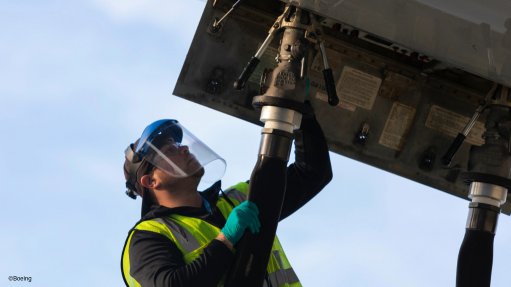National composite cluster launched to stimulate advanced manufacturing
The Composite Cluster, which was launched by the Department of Trade and Industry (DTI) space affairs chief director Nomfuneko Majaja during the inaugural Advanced Manufacturing and Composites Show, in Port Elizabeth, on Wednesday, aims to support the development and use of composites as part of advanced manufacturing in South Africa.
The cluster, headed by MD Andy Radford, is an extension of the Mandela Bay Composite Cluster, which started in 2015 from foundational work by the Council for Scientific and Industrial Research, and critical input from Delft University of Technology advanced manufacturing hub head Dr Kjelt Rijswijk. It has grown from 13 member companies to 53 members over the past two-and-a-half years.
Composites are key materials in advanced manufacturing and specifically in the aerospace, aviation and defence industries. However, there is growing application and potential use for these materials in the automotive, construction and building materials sectors. The cluster, therefore, aims to support the broader use of composites as an entry point into advanced manufacturing, said Radford.
The use of composites cuts across sectors and is part of the clustering approach of the DTI to accelerate the move towards advanced manufacturing and to diversify the economy, said Majaja.
"Our industries are highly fragmented and clusters bring together various role-players to foster engagement. Changing the mindset of industry with regard to collaboration, learning and innovation is key to moving towards advanced manufacturing and new ways of manufacturing smartly and efficiently," she said.
The aerospace industry led in the initial use of advanced manufacturing techniques, and overcoming the unique challenges facing the industry and this mindset is what can be stimulated in pursuit of moving South African industries to advanced manufacturing techniques and processes.
Clusters, in addition to special economic zones and industrial parks, form part of a strategy to boost competitiveness in the South African economy, with a key focus on providing a learning and skills development environment to explore and pilot the rapid reskilling of people that will be required as part of adapting to the Fourth Industrial Revolution (4IR).
"There is a skills gap and a commercialisation gap between technology opportunities and technology commercialisation in South Africa. Clusters are viewed as an instrument to bridge this gap and this is imperative to develop industry, promote innovation, develop new products and assist in the diversification of the economy, of which manufacturing is central to development," said Majaja.
The launch of the Composite Cluster took place during a technical seminar stream on advanced manufacturing, which explored the concepts and technologies that underpinned the changes sweeping through manufacturing and all industries.
Radford highlighted that the launch of the cluster was complemented by the aim of recognising innovation within industries by presenting awards for innovative work and development.
The complexities expected as part of the transition to the 4IR were highlighted by Progressus director Dr Harry Teifel and Nelson Mandela Bay Metropolitan University futurist Professor Chris Adendorff. They spoke about the impacts and dramatic changes in the structure and dynamics of manufacturing value chains that were taking place as a result of artificial intelligence, Big Data, the Internet of Things, robotics, biotechnology, three-dimensional printing (additive manufacturing), blockchain and nanotechnology.
The experts emphasised that insular innovation was no longer viable to provide a competitive edge for companies and that value chains would become value networks, with different parts of the network responding to demands in a dynamic and collaborative manner. This changes the traditional approach to gain and secure competitive advantage, as well as product development and manufacturing.
"The combined effects of disruptive technologies are far more significant than the disruption caused by any one technology, and mean that ever-changing competencies will be required to fulfil the demands on any part of the value network, which increases the need for collaboration and cooperation," explained Teifel.
Preparing for the impacts of the 4IR would require that industries and experts unlearn thought patterns that were no longer relevant and relearn new skills, such as working and innovating in teams, as well as leveraging the competencies of other organisations to fulfil their goals.
About 60% of jobs that will exist in ten years' time, have not yet been invented. Despite the uncertainty, the current revolution would improve life for people, just like the prior three had done.
What was crucial was for companies to approach the changes with a positive mindset, and to actively engage with and adapt to these changes, because an approach of merely adapting or continuing with current practices would lead to a self-fulfilling prophecy of lower comparative competitiveness of organisations that do not adapt, and their eventual relegation and dissolution, explained Adendorff.
Comments
Press Office
Announcements
What's On
Subscribe to improve your user experience...
Option 1 (equivalent of R125 a month):
Receive a weekly copy of Creamer Media's Engineering News & Mining Weekly magazine
(print copy for those in South Africa and e-magazine for those outside of South Africa)
Receive daily email newsletters
Access to full search results
Access archive of magazine back copies
Access to Projects in Progress
Access to ONE Research Report of your choice in PDF format
Option 2 (equivalent of R375 a month):
All benefits from Option 1
PLUS
Access to Creamer Media's Research Channel Africa for ALL Research Reports, in PDF format, on various industrial and mining sectors
including Electricity; Water; Energy Transition; Hydrogen; Roads, Rail and Ports; Coal; Gold; Platinum; Battery Metals; etc.
Already a subscriber?
Forgotten your password?
Receive weekly copy of Creamer Media's Engineering News & Mining Weekly magazine (print copy for those in South Africa and e-magazine for those outside of South Africa)
➕
Recieve daily email newsletters
➕
Access to full search results
➕
Access archive of magazine back copies
➕
Access to Projects in Progress
➕
Access to ONE Research Report of your choice in PDF format
RESEARCH CHANNEL AFRICA
R4500 (equivalent of R375 a month)
SUBSCRIBEAll benefits from Option 1
➕
Access to Creamer Media's Research Channel Africa for ALL Research Reports on various industrial and mining sectors, in PDF format, including on:
Electricity
➕
Water
➕
Energy Transition
➕
Hydrogen
➕
Roads, Rail and Ports
➕
Coal
➕
Gold
➕
Platinum
➕
Battery Metals
➕
etc.
Receive all benefits from Option 1 or Option 2 delivered to numerous people at your company
➕
Multiple User names and Passwords for simultaneous log-ins
➕
Intranet integration access to all in your organisation


















